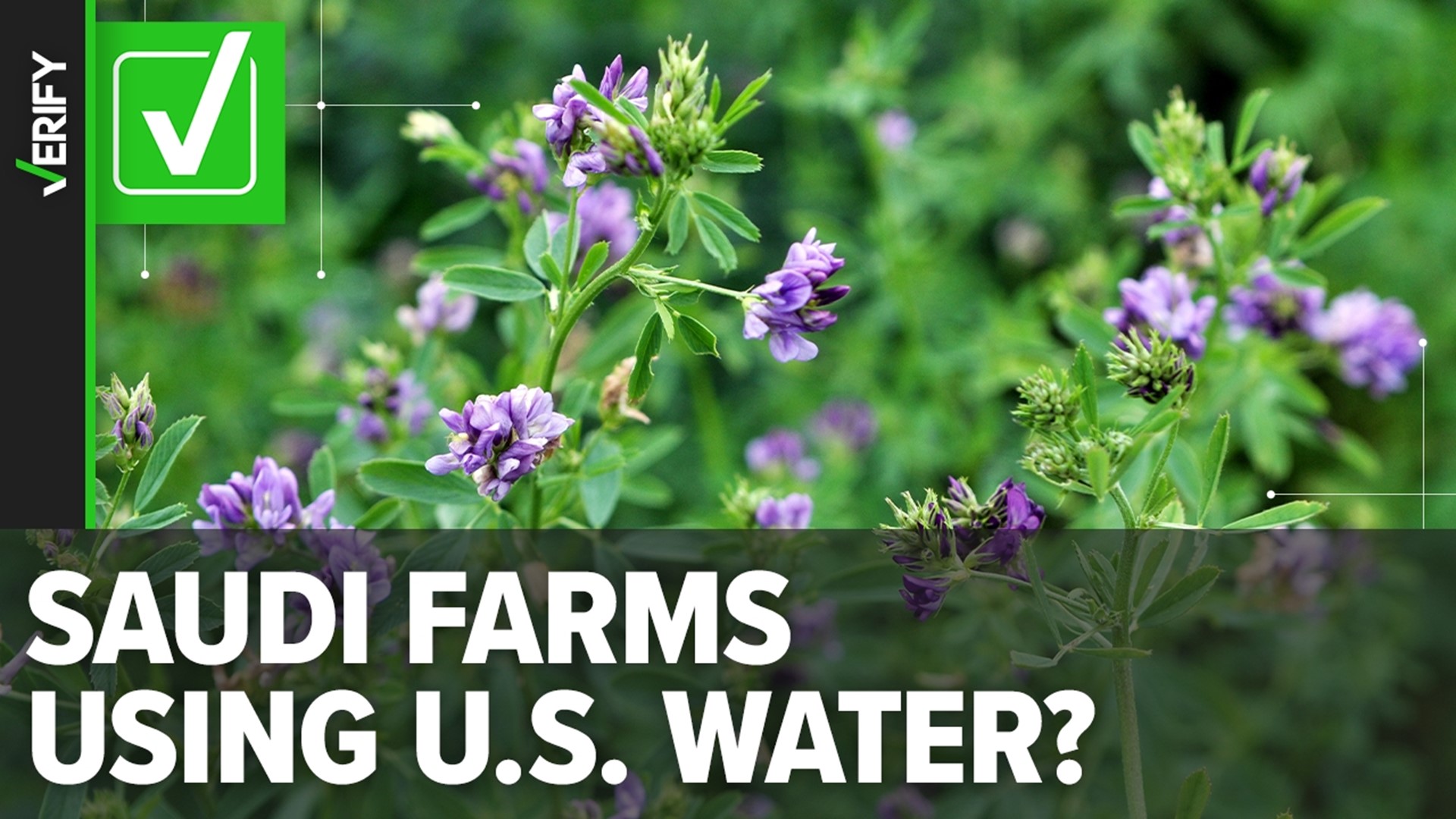UPDATE: Arizona Gov. Katie Hobbs announced on Oct. 2, 2023, that she has canceled one of Saudi-owned farming company Fondomonte’s state land leases, citing default on the lease. The state will not renew three other leases in February 2024, she said. The original story continues below:
Despite recent rainfall, nearly one-quarter of the United States is still experiencing drought conditions – including parts of the southwest.
A viral TikTok claims that a Saudi Arabia-based company is using water from the drought-prone states of California and Arizona to grow alfalfa that’s sent overseas. Alfalfa is a water-intensive crop that’s often used to feed grazing animals like cows.
VERIFY reader Lisa also asked if Saudi Arabia is actually using water in Arizona to grow alfalfa.
THE QUESTION
Does a Saudi Arabian company use water from Arizona and California to grow alfalfa?
THE SOURCES
- Arizona State Land Department records
- Statements issued by Saudi Arabia’s government and dairy company Almarai
- La Paz County supervisor Holly Irwin
- Natalie Koch, Ph.D., professor of geography at Syracuse University
- U.S. Department of Agriculture (USDA)
- The Wilson Center
THE ANSWER
Yes, a Saudi Arabian company uses water from Arizona and California to grow alfalfa.
WHAT WE FOUND
A Saudi Arabian company grows alfalfa on farmland in Arizona and California and sends it overseas to feed the country’s cows. These legal farming operations extract groundwater in Arizona and water from the Colorado River across the border in California, experts told VERIFY.
In March 2014, Fondomonte Arizona, a subsidiary of the Saudi Arabian dairy company Almarai, purchased 9,834 acres of farmland in Vicksburg, Arizona, for $47.5 million. The town is located in La Paz County, about 100 miles outside of Phoenix.
The company said in a press release that the land would be used to “improve and secure its supply of the highest quality alfalfa hay” from areas outside of Saudi Arabia.
Fondomonte also leases thousands of acres of farmland from the Arizona State Land Department in La Paz County, records show, and another Fondomonte subsidiary in California owns at least 1,790 acres of farmland in the city of Blythe along the California-Arizona border.
Why Saudi Arabia is growing alfalfa in the U.S.
So why does Saudi Arabia rely on overseas farms to grow alfalfa? The country finalized a ban in 2018 on the growth of alfalfa and other crops that were straining its water supply, Natalie Koch, a professor of geography at Syracuse University, said.
Almarai likely chose to farm alfalfa in these regions of Arizona and California for several reasons. Alfalfa grows quickly in desert climates like those of La Paz County and Blythe, according to Koch.
The crop is grown in other western states, too, including Colorado, Nevada, Utah and Oregon.
“If you have enough water to pump to irrigate it, then you can get many cuts [of alfalfa] in a year in a desert,” Koch said.
In addition, Fondomonte also benefits from the lack of groundwater pumping regulations in Arizona’s La Paz County.
“If you can invest the capital to drill a deep well that can get deep into the groundwater supply, then you can really pump as much as you want,” Koch said. “This was appealing to the Saudis as well to go [to La Paz County], where they’re not being charged for water they extract because there’s no measuring of it.”
It’s not uncommon for overseas companies to own farmland in the U.S. A report from the U.S. Department of Agriculture’s Farm Service Agency found that foreign investors had a stake in about 5% of U.S. agricultural land as of Dec. 31, 2021.
Similarly, many American companies invest in farms in other countries to grow produce. For example, tomatoes, berries and avocados are grown in Mexico for the U.S.

